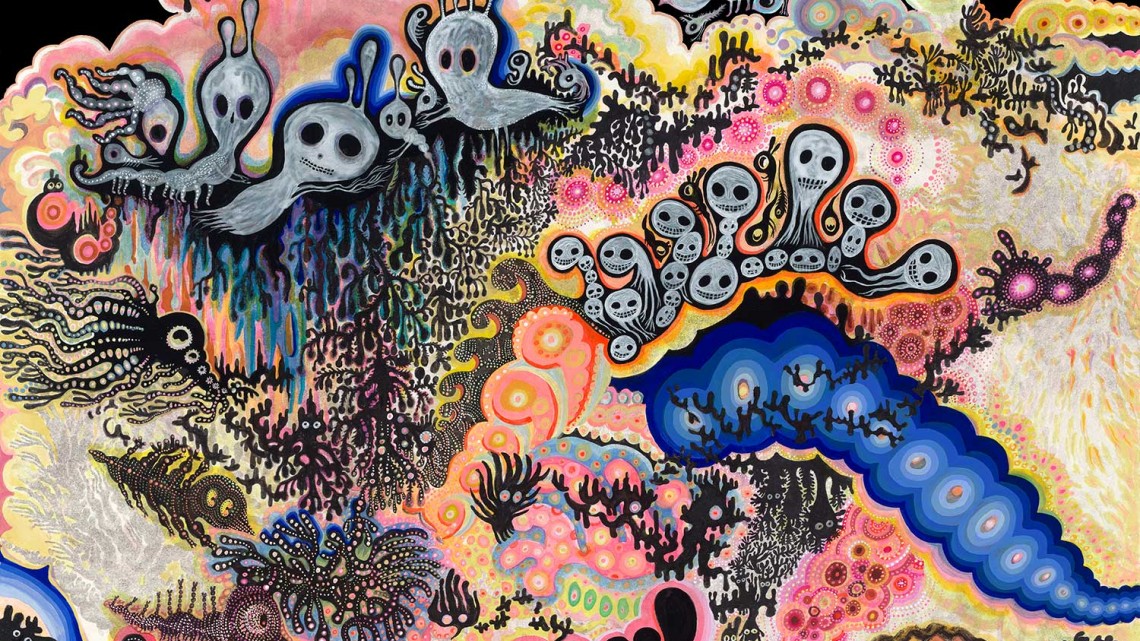
'Ghost Graffitti' by Andrea Dezsö, the image representing the Society for the Humanities 'Afterlives' theme.
News directly from Cornell's colleges and centers
Society for the Humanities 'Afterlives' theme draws record interest
By Kate Blackwood
During 2020, a year of shutdown, revolt, and crisis — but also hope and transformation – Cornell’s Society for the Humanities chose “Afterlives” as its theme for 2021-22. Scholars from all over the world and all around the College of Arts and Sciences responded to the call, resulting in a record number of applications for the Society’s fellowships.
“The concept of ‘Afterlives’ captures and illuminates the essential characteristic of our present time,” said Naminata Diabate, associate professor of comparative literature and a member of the Humanities Council, which chose the theme following “intense debate,” she said. “Certainly, every second and every minute is one of past and future, but in recent memory, last year was one of aspiration, hope and demise. ‘Afterlives’ is our opportunity to bear witness to the watershed moment of our collective history.”
Six external scholars have been chosen as Society for the Humanities Fellows from among 330 applications—nearly double the number typically received, said Annette Richards, the Given Foundation Professor in the Humanities and interim director of the Society for the Humanities. Applications were strong in the other categories, as well: Society for the Humanities Faculty Fellows (open to Cornell faculty); Mellon Graduate and Postdoctoral Fellows; and HSP Postdoctoral Associates.
In the coming year, external and internal fellows will focus on their research and writing, and also meet weekly to discuss their work. Fellows teach an upper-level seminar related to their research.
“We are bringing together an extraordinarily vibrant group for the ‘Afterlives’ year,” Richards said. “We anticipate not only a great deal of lively interaction among the Fellows and their Cornell colleagues, but also strong interest in the ‘afterlives’ theme among students.”
Each year, the Society for the Humanities organizes its program around a focal theme that cuts across disciplines and methods, and serves as a catalyst for the newest humanistic inquiry, Richards said. This year, the six external Society for the Humanities Fellows will approach “Afterlives” from perspectives in art history, comparative literature, English, history, music and women’s and gender studies and disability studies.
In one project, Leslie Alexander, associate professor of history at Arizona State University, will explore the legacies of slavery in modern-day policing and mass incarceration.
In another, Yomaira Figuera, associate professor of global diaspora studies in the Department of English at Michigan State University, will investigate how we trace Black diasporic life and the afterlives of colonial subjectivity, U.S. citizenship, imperial interests, and the erasure of settler colonialism. “A central question concerns how to write such a history when we lack official records and archival materials about enslaved Africans in Puerto Rico and their descendants,” Figuera wrote.
The project “Ruin Sound: Audio Afterlives, Reenactment, and Remembrance in the 21st Century,” by music scholar María Edurne Zuazu, is particularly close to the “Afterlives” theme, Diabate said.
“The project has changed my understanding of music and sound as fundamentally joyful, immaterial and ephemeral,” Diabate said. “Zuazu claims that past, present and future are entangled in one performance. For instance, the past lingers as vestiges in commemorations, and the ruined present can act as a rehearsal for a future, which can only be heard faintly.”
One of the great benefits of the fellowship program is what these renowned scholars bring to Cornell, said Paul Fleming, the L. Sanford and Jo Mills Reis Professor of Humanities and the Taylor Family Director of the Society for the Humanities.
In addition, four A&S faculty have been named Society for the Humanities Faculty Fellows:
- Tao Leigh Goffe, assistant professor of Africana studies and feminist, gender and sexuality studies, “After Eden: Afro-Asia Bioengineering and Wildlife in the Caribbean”
- Seema Golestaneh, assistant professor of near eastern studies, “Utopia Lost: Afghan Theories of Islamic Governance”
- Noah Tamarkin, assistant professor of anthropology, “Carceral Afterlives: Postcolonial Forensic Genetics in a Securitizing World”
- and Irina R. Troconis, assistant professor of Latin American studies, “Spectral Remains: The Politics of Memory in the Afterglow of Hugo Chávez’s Bolivarian Revolution.”
“There is perhaps no structure more vital to work on right now than ‘afterlives,’ from the afterlives of slavery and colonialism to the various modes, rituals, and strategies that people mobilize either to cultivate and keep alive a past or to put an end to an afterlife that seems to refuse to die,” Fleming said. “Our hope is to examine collectively the different modalities of afterlives: how things survive, how they fade away, and what emerges changed.”
The fellowship year gives external and Cornell faculty fellows crucial time for their own work, he added, but the result is also a long-term deepening and broadening of Cornell’s humanities networks.
“Academic work is never done in isolation, even when, as in the humanities, it requires substantial time alone in archives or simply at the desk,” Fleming said. “It is essential that ideas travel, and the Society for the Humanities is a central hub for this transference of ideas.”
Media Contact
Get Cornell news delivered right to your inbox.
Subscribe

